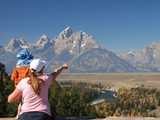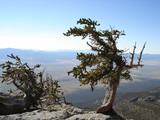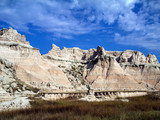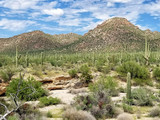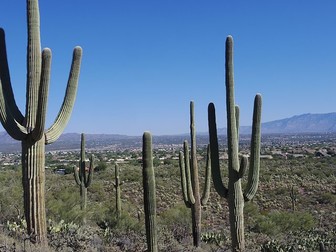Government Grants
Business Grants
Home Owner Programs
Federal Programs
About Us
Southwest Border Resource Protection Program
The Southwest Border Resource Protection Program (SWBRPP) provides financial assistance to NPS units, as well as educational institutions, nonprofit organizations, tribes, and local and state agencies to improve resource stewardship, achieve international cooperation, provide meaningful interpretation
and conduct scientific research, which will lead to increased appreciation and understanding of our shared natural and cultural heritage along our international border with Mexico.
Several National Parks located along the U. S. border with Mexico have recently experienced serious resource damage due to illegal cross border activities including drug traffickers and undocumented persons traversing the parks.
Other national park units within the desert southwest have also experienced impacts to their natural and cultural resources.
Thousands of miles of unauthorized roads and trails have been created, major ecological processes and the migration patterns of wildlife have been disrupted, important historic sites have been vandalized, and archaeological sites have been looted.
Program funding is available for conducting scientific research and monitoring of species, as well as conservation, interpretation and preservation projects designed to help protect and preserve natural and cultural resources located near or along our international border.
Applicants must work with and benefit an NPS unit in the Intermountain Region along the U. S. – Mexico border as well as a protected area in Mexico by addressing cultural or natural resource issues shared by both countries.
These parks include Organ Pipe Cactus National Monument, Big Bend National Park, Amistad National Recreation Area, Palo Alto National Historic Site, Padre Island National Seashore, Saguaro National Park, Tumacacori National Historical Park, Chamizal National Memorial, Coronado National Memorial, and Chiricahua National Monument.
Please note that applicants can work with other Intermountain Region parks near the U. S. Mexico Border, or not otherwise listed to support cultural or natural resource issues shared by both countries.
The projects and activities will be individually authorized by separate awards, with each project or activity having a separate work plan and budget developed cooperatively between the NPS and the cooperator.
Project categories include:
Research & MonitoringCultural Resource examples:Identification, research, and evaluation of archeological and historic sitesNational Register of Historic Places nominationsNational Historic Landmark nominationsNatural Resource examples:Wildlife habitat managementInventory and monitoring of invasive plants and animalsImpacts from climate change to endangered speciesAssessments of the effects of border activities on threatened and endangered speciesConservation & PreservationCultural Resource examples:Stabilization, rehabilitation, and restoration of historic structures, archeological sites, trails and landscapesConservation of collectionsNatural Resource examples:Reestablishment of natural processes and ecological systemsMonitoring of resource damage caused by human developmentsProtection and conservation endangered and threatened speciesIntegrated pest management planningRestoration of native wildlife and vegetation, including removal of exotic speciesInterpretation, Education & TourismProfessional training and exchange such as:Student intern programsWorkshops, seminars, symposia, training programsBinational conferencesInformational network gatheringsDevelopment of interpretive materials, programs, workshopsGeotourism
Several National Parks located along the U. S. border with Mexico have recently experienced serious resource damage due to illegal cross border activities including drug traffickers and undocumented persons traversing the parks.
Other national park units within the desert southwest have also experienced impacts to their natural and cultural resources.
Thousands of miles of unauthorized roads and trails have been created, major ecological processes and the migration patterns of wildlife have been disrupted, important historic sites have been vandalized, and archaeological sites have been looted.
Program funding is available for conducting scientific research and monitoring of species, as well as conservation, interpretation and preservation projects designed to help protect and preserve natural and cultural resources located near or along our international border.
Applicants must work with and benefit an NPS unit in the Intermountain Region along the U. S. – Mexico border as well as a protected area in Mexico by addressing cultural or natural resource issues shared by both countries.
These parks include Organ Pipe Cactus National Monument, Big Bend National Park, Amistad National Recreation Area, Palo Alto National Historic Site, Padre Island National Seashore, Saguaro National Park, Tumacacori National Historical Park, Chamizal National Memorial, Coronado National Memorial, and Chiricahua National Monument.
Please note that applicants can work with other Intermountain Region parks near the U. S. Mexico Border, or not otherwise listed to support cultural or natural resource issues shared by both countries.
The projects and activities will be individually authorized by separate awards, with each project or activity having a separate work plan and budget developed cooperatively between the NPS and the cooperator.
Project categories include:
Research & MonitoringCultural Resource examples:Identification, research, and evaluation of archeological and historic sitesNational Register of Historic Places nominationsNational Historic Landmark nominationsNatural Resource examples:Wildlife habitat managementInventory and monitoring of invasive plants and animalsImpacts from climate change to endangered speciesAssessments of the effects of border activities on threatened and endangered speciesConservation & PreservationCultural Resource examples:Stabilization, rehabilitation, and restoration of historic structures, archeological sites, trails and landscapesConservation of collectionsNatural Resource examples:Reestablishment of natural processes and ecological systemsMonitoring of resource damage caused by human developmentsProtection and conservation endangered and threatened speciesIntegrated pest management planningRestoration of native wildlife and vegetation, including removal of exotic speciesInterpretation, Education & TourismProfessional training and exchange such as:Student intern programsWorkshops, seminars, symposia, training programsBinational conferencesInformational network gatheringsDevelopment of interpretive materials, programs, workshopsGeotourism
Who's Eligible
Obtain Full Opportunity Text:
https://grants.nih.gov/grants/guide/rfa-files/RFA-CA-24-006.html
Additional Information of Eligibility:
Other Eligible Applicants include the following: Alaska Native and Native Hawaiian Serving Institutions; Asian American Native American Pacific Islander Serving Institutions (AANAPISISs); Eligible Agencies of the Federal Government; Faith-based or Community-based Organizations; Hispanic-serving Institutions; Historically Black Colleges and Universities (HBCUs); Indian/Native American Tribal Governments (Other than Federally Recognized); Non-domestic (non-U.S.) Entities (Foreign Organizations); Regional Organizations; Tribally Controlled Colleges and Universities (TCCUs) ; U. S. Territory or Possession.
Full Opportunity Web Address:
http://grants.nih.gov/grants/guide/rfa-files/RFA-CA-24-006.html
Contact:
Agency Email Description:
todd_wilson@nps.gov
Agency Email:
Date Posted:
2023-10-16
Application Due Date:
Archive Date:
2024-01-17
Social Entrepreneurship
Spotlight
When it Comes to Social Enterprises, Failure is the Best Platform for Innovation

In the world of social enterprises, failure is a cringe-worthy moment nobody wants to talk about. But, social entrepreneurs can benefit from their failures.
